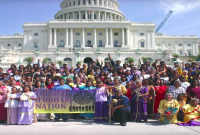Support strong Canadian climate journalism for 2025
With a few swipes of his Sharpie, Donald Trump assuaged America's fears of another government shutdown Friday, but not before declaring a national emergency at the U.S.-Mexico border.
The move is a bid for billions of dollars in wall-building money that critics denounced as an illegal abuse of executive power.
White House press secretary Sarah Sanders tweeted a photo of Trump signing the emergency declaration while the president was outside in the Rose Garden, hosting another combative, from-the-hip news conference that began with a lengthy celebration of his trade agenda and ended with the suggestion he should be nominated for the Nobel Peace Prize.
Virtually from the outset, the president appeared to be in a defensive posture about the emergency declaration. He continued to frame it as an effort to block illegal migration, which he insists brings a steady flow of drugs, violence and crime.
"It's been signed many times before. It's been signed by other presidents," Trump said. "They signed it for far less important things, in some cases — in many cases. We're talking about an invasion of our country with drugs, with human traffickers, with all types of criminals and gangs."
The move had congressional Democrats on a war footing.
"The president's unlawful declaration over a crisis that does not exist does great violence to our constitution and makes America less safe, stealing from urgently needed defence funds for the security of our military and our nation," House of Representatives Speaker Nancy Pelosi and Senate Democratic Leader Chuck Schumer said in a statement.
"The president is not above the law. The Congress cannot let the president shred the constitution."
Some Republicans weighed in against Trump: Sen. Lamar Alexander, who is not seeking re-election in Tennessee, called it "unnecessary, unwise and inconsistent" with the constitution, and warned against the risk of a Democratic president declaring emergencies to shut down coal plants or force working Americans into Medicare. Senators Lisa Murkowski, Susan Collins and Rand Paul also broke ranks, albeit not for the first time.
Threats of legal action soon began pouring in — including from the American Civil Liberties Union and the state of California, where Gov. Gavin Newsom described Trump's cherished border wall as "a monument to stupidity."
In a statement, the ACLU said it plans to argue that the president is overstepping both his authority and the parameters of the law he has invoked, which executive director Anthony Romero said is limited to military construction projects required to support the emergency use of U.S. armed forces.
"This is a patently illegal power grab that hurts American communities and flouts the checks and balances that are hallmarks of our democracy."
Friday was the deadline declared three weeks ago when Trump finally halted a 35-day government shutdown, the longest in U.S. history — a legacy of his dispute with congressional Democrats over demands for $5.7 billion for the wall. It was the centrepiece of his successful 2016 election campaign and something he'd initially insisted would be paid for by Mexico.
Democrats and Republicans toiled well into the evening Thursday to come up with a compromise that provided Trump with $1.375 billion in border-security funding — well short of his total demand and even less than the original offer that triggered the Dec. 22 shutdown. Trump signed that bill later Friday, although he didn't breathe a word about it in the Rose Garden.
The ACLU also latched on to another peculiarity of Trump's news conference that was making the rounds of Twitter feeds: that the president undermined his own argument by implying that there's nothing particularly emergency-like about his national emergency.
"I didn't need to do this but I'd rather do it much faster," he acknowledged.
The move gives Trump access to a pool of funds totalling roughly $8 billion, including the $1.4 billion from Congress and some $6 billion in Department of Defense funding. But it also exposes prominent Republicans, including the president himself, to cries of hypocrisy, considering the outrage they showed at former president Barack Obama’s frequent use of executive action.
It's also sure to put the White House in a protracted court battle.
"We will have a national emergency and we will then be sued," Trump said in a melodic, sarcastic voice, not quite rolling his eyes. "We will possibly get a bad ruling, and then we'll get another bad ruling, and then we'll end up in the Supreme Court and hopefully we'll get a fair shake and we'll win in the Supreme Court."
Elizabeth Goitein, a co-director of the national security program at New York University's Brennan Center for Justice, called Trump's move a "grotesque abuse of power."
"Emergency powers are for emergencies, not for circumventing the will of Congress on questions of policy," Goitein said in a statement. "Congress should learn its lesson: gifting presidents with limitless discretion and hoping they won't abuse it is taking dangerous risks with our democracy."





Comments